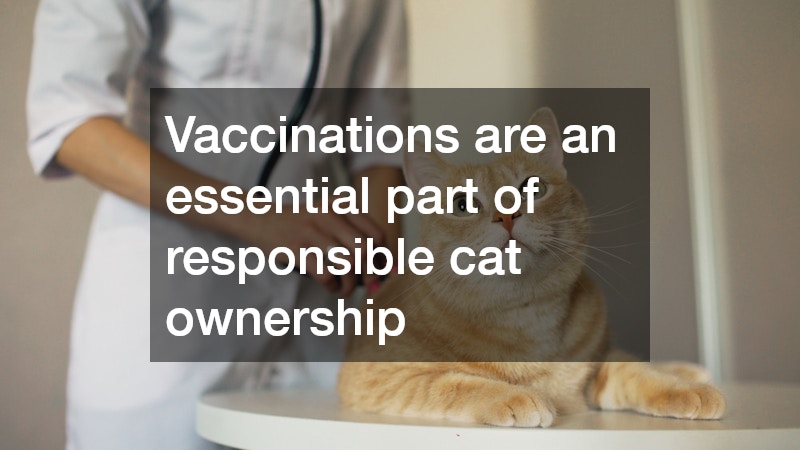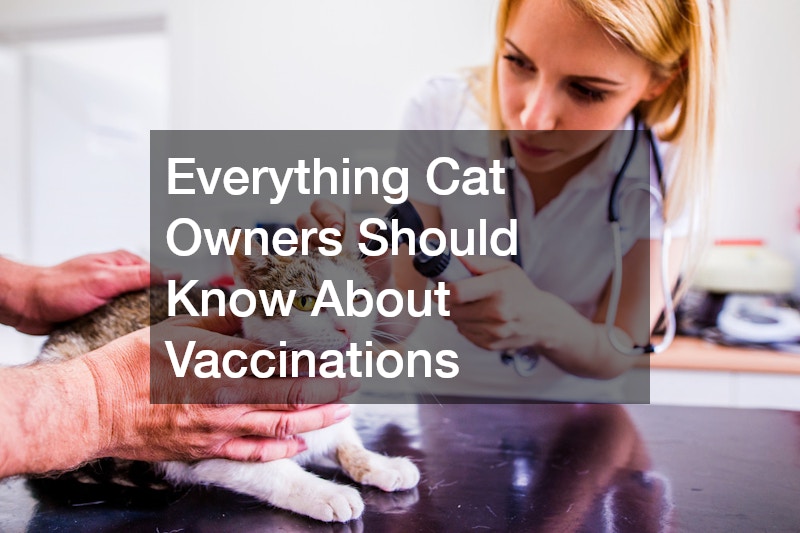Vaccinations are an essential part of responsible cat ownership, safeguarding our feline friends from serious diseases. The purpose of this article is to provide cat owners with a comprehensive understanding of the vaccinations their pets need and when they should receive them. Readers will learn about both core and non-core vaccines, vaccination schedules, potential side effects, and the broader impacts of these preventative measures.
What Are the Essential Vaccinations for Cats?
Core Vaccines: Feline Viral Rhinotracheitis, Calicivirus, and Panleukopenia
The core vaccines for cats include Feline Viral Rhinotracheitis, Calicivirus, and Panleukopenia, commonly known as the FVRCP vaccine. Feline Viral Rhinotracheitis is a highly contagious respiratory disease that can lead to severe respiratory infections.
Calicivirus, another respiratory illness, can also cause oral ulcers, while Panleukopenia is a highly contagious viral disease that affects the gastrointestinal tract and can be fatal.
Vaccinating against these diseases is vital as they pose a significant threat to cats, especially kittens and unvaccinated adults. These core vaccines are usually administered in a series to young kittens to establish immunity early on in life. Regular reinforcements or boosters are also necessary to maintain immunity levels against these serious diseases.
By ensuring that cats receive their core vaccinations on schedule, owners can significantly reduce the risk of severe illness, thereby contributing to better overall health outcomes for their pets. Vaccinated cats also create a safer community for other pets and can help in controlling outbreaks of these diseases. Cat owners need to maintain an open line of communication with their veterinarians about these vaccinations.
Non-Core Vaccines: When Are They Necessary?
Non-core vaccines are not routinely required for all cats, but are essential depending on the cat’s lifestyle and environment. For instance, the Feline Leukemia Virus vaccination is especially important for cats that roam outdoors or interact with other felines frequently. Similarly, the Rabies vaccine is mandated by law in many regions and is crucial for any cat that may come into contact with wildlife.
Veterinarians typically assess a cat’s risk factors to determine if non-core vaccinations should be incorporated into their healthcare plan. Kittens, outdoor cats, or those in multi-cat households are often more susceptible to diseases that these non-core vaccines protect against. Understanding these factors allows owners to make informed decisions that align with their cat’s individual needs.
Additionally, always consult with a veterinarian to stay updated on the latest recommendations for non-core vaccines, as guidelines may vary based on geographical location and emerging disease trends. This proactive approach ensures that cats are protected from potential threats that may arise in their specific environments. Ultimately, vaccines, whether core or non-core, are a critical aspect of feline wellness and long-term health.
What Are the Common Side Effects of Cat Vaccinations?
Immediate Reactions: What to Watch For
After receiving a cat vaccination, cats may exhibit some immediate side effects, which are usually mild and temporary. Common reactions include localized swelling at the injection site, mild fever, and lethargy. Most cats recover quickly from these side effects without intervention, but owners should monitor their pets closely during the 24 to 48 hours following vaccination.
Some cats may also experience decreased appetite or occasional sneezing, which generally resolves within a short period. These immediate side effects are a normal response as the cat’s immune system begins producing the necessary antibodies to prevent disease. Being mindful of these reactions can help owners identify when something may be amiss.
If a cat shows excessive or prolonged side effects or if symptoms escalate beyond the typical reactions, owners should consult their veterinarian immediately. Understanding the signs of an adverse reaction helps ensure prompt care if necessary. It’s always better to err on the side of caution when it comes to your feline friend’s health.
Long-term Reactions: Are They Possible?
While most cats tolerate vaccinations well, some may experience long-term reactions, although these instances are quite rare. Potential long-term effects can include the development of a vaccine-associated sarcoma, which is a type of cancer linked to specific vaccines. These conditions are uncommon, affecting a very small percentage of cats, but they’re important for pet owners to be aware of.
Many veterinarians take precautions by administering vaccines in specific locations to minimize the risk of localized reactions. It’s also essential for cat owners to remain vigilant about any unusual symptoms that may appear weeks or months after vaccination. Regular follow-ups and open communication with a veterinarian can help identify any health issues early on.
Vaccinations are a vital component of responsible cat ownership and significantly contribute to the health and well-being of felines. By understanding the importance of core and non-core vaccines, cat owners can protect their pets from serious diseases and infections. A comprehensive awareness of vaccination schedules, potential side effects, and the broader implications for community health reinforces the idea that proactive healthcare leads to healthier, happier cats.


